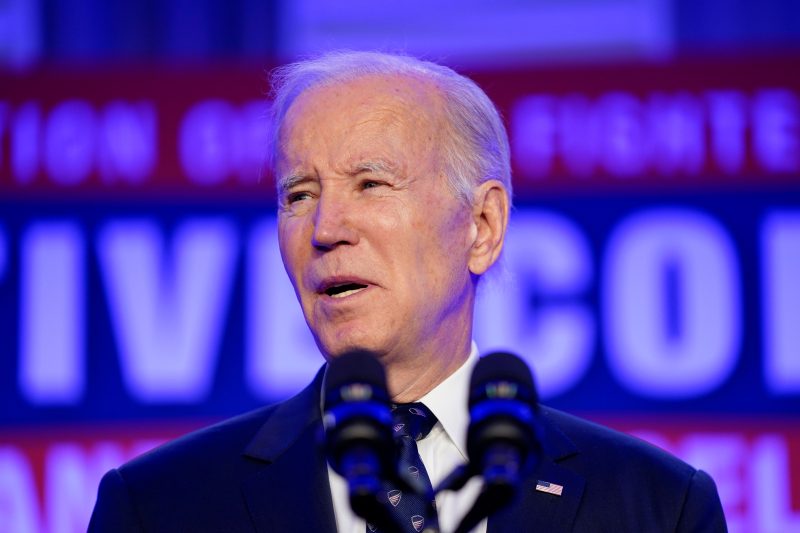
Biden to propose 5.2 percent federal pay increase, largest in 43 years
President Biden is expected to propose a 5.2 percent raise for federal employees in his budget set to be released Thursday — the largest increase the White House has put forward since Jimmy Carter was president.
That salary boost, which would go into effect in January, will be in Biden’s budget proposal for the fiscal year that starts Oct. 1, according to a senior federal official who spoke on the condition of anonymity because they were not authorized to discuss the decision. Another official familiar with the decision, also speaking on the condition of anonymity, confirmed the proposal.
The raise would be the largest pay increase for the workforce of 2.1 million executive branch employees since a 9.1 percent increase in 1980. But it would still fall short of the 8.7 percent raise called for in legislation introduced in the House and Senate and backed by several Democrats and federal employee unions.
The Office of Management and Budget and the White House declined to comment.
House Republicans are likely to oppose an increase of that size, as the conservative majority has pledged to reduce federal spending and to better hold the federal workforce accountable for what they have criticized as poor customer service at some agencies.
“President Biden is continuing to ensure that federal workers’ pay and benefits are insulated from the price-tag of inflation, but it will be paid for by American taxpayers who continue to be harmed by the Biden Administration’s inflationary policies,” House Oversight Committee Chairman James Comer (R-Ky.) said in a statement. “We should be putting American taxpayers first, not the federal bureaucracy.”
In making the case for the largest raise in more than four decades, Biden can sharpen a contrast with Republicans over the value of government work to taxpayers and underscore his alliance with labor as he heads into a likely reelection campaign. Some allies in Congress pledged to fight for a robust increase.
“Paying our civilian and military employees ought to be a bipartisan issue, and I hope my Republican colleagues work alongside Democrats this year on a strong adjustment that can meet their needs,” Rep. Steny H. Hoyer (D-Md.), whose district includes thousands of federal workers, said in a statement.
The federal government’s largest unions, however, held back from endorsing the proposal, saying Biden should recommend an even bigger increase for their members.
“While we recognize the significance of this pay raise, more must be done to keep up with inflation and to begin to make serious progress in closing the double-digit pay gap between federal employees and their private sector counterparts,” Everett Kelley, national president of the American Federation of Government Employees, said in an email.
Congress should instead pass legislation calling for an 8.7 percent raise, said Kelley, whose union represents 750,000 federal and D.C. employees.
Tony Reardon, president of the National Treasury Employees Union, which represents about 150,000 federal workers, called the forthcoming increase a “solid first step” in the looming budget debate on Capitol Hill over raising the country’s borrowing limit, with Republicans calling for spending cuts to federal agencies. Reardon said an 8.7 percent increase would track the 2023 cost-of-living increases provided for retirees on Social Security and is more appropriate.
“We believe rising costs and previous years of inadequate pay increases warrant the average 8.7 percent adjustment called for in the FAIR Act,” Reardon said in a statement, referring to the Federal Adjustment of Income Rates Act sponsored by Rep. Gerald E. Connolly (D-Va.) and Sen. Brian Schatz (D-Hawaii).
Biden’s recommendation for the notably large pay boost underscores his administration’s tight partnership with federal employee unions, who can bargain over working conditions but not wages, which are set by Congress. The unions have enjoyed significant clout in his administration, in contrast with the Trump administration, which often clashed with civil servants and their representatives.
Within days of taking office, Biden revoked Trump-directed executive orders that aimed to restrict employees’ bargaining and appeal rights and remove civil service protections from a large class of employees. The White House has told agencies instead to expand bargaining to a wider range of issues and highlight employee union rights in recruitment and orientation for new employees. Telework, after intensifying during the worst of the coronavirus pandemic, has remained at historic levels despite pressure from Republicans on Capitol Hill to return to pre-pandemic practices.
Raises for federal employees are negotiated during broader deliberations in Congress over government spending, with final decisions typically coming late in the year. This is the third year that Biden has relied on guidance from a federal pay law that calls for tying raises to a Labor Department index of private-sector wage growth called the Employment Cost Index — in this case, growth from October 2021 through September 2022.
Trump, by contrast, twice proposed freezing salary rates and in two other years came in under the recommendation of the pay index, although the workforce was ultimately granted raises each year during his term, ranging from an across-the-board 1 percent to 3.1 percent.
After Congress took no position on a raise for this year, Biden’s recommendation for a 4.6 percent pay hike took effect by default in January. Biden also followed the pay law in recommending a 2.7 percent raise for 2022.
The federal raise is an average across the government, with increases slightly higher in about four dozen urban areas. The amounts vary based on a comparison by occupation of federal and private sector salaries in an area.
Tyler Pager contributed to this report.
